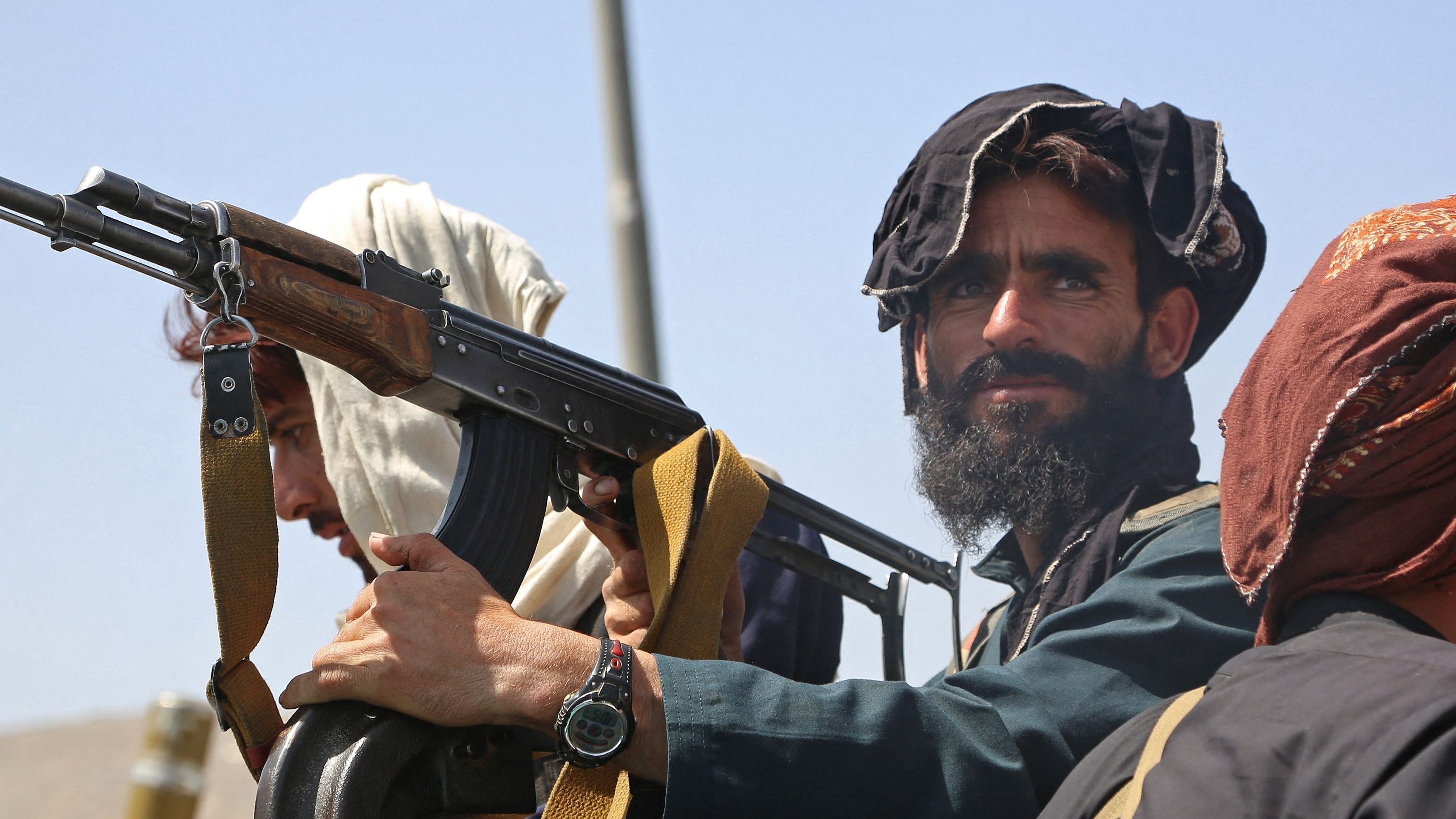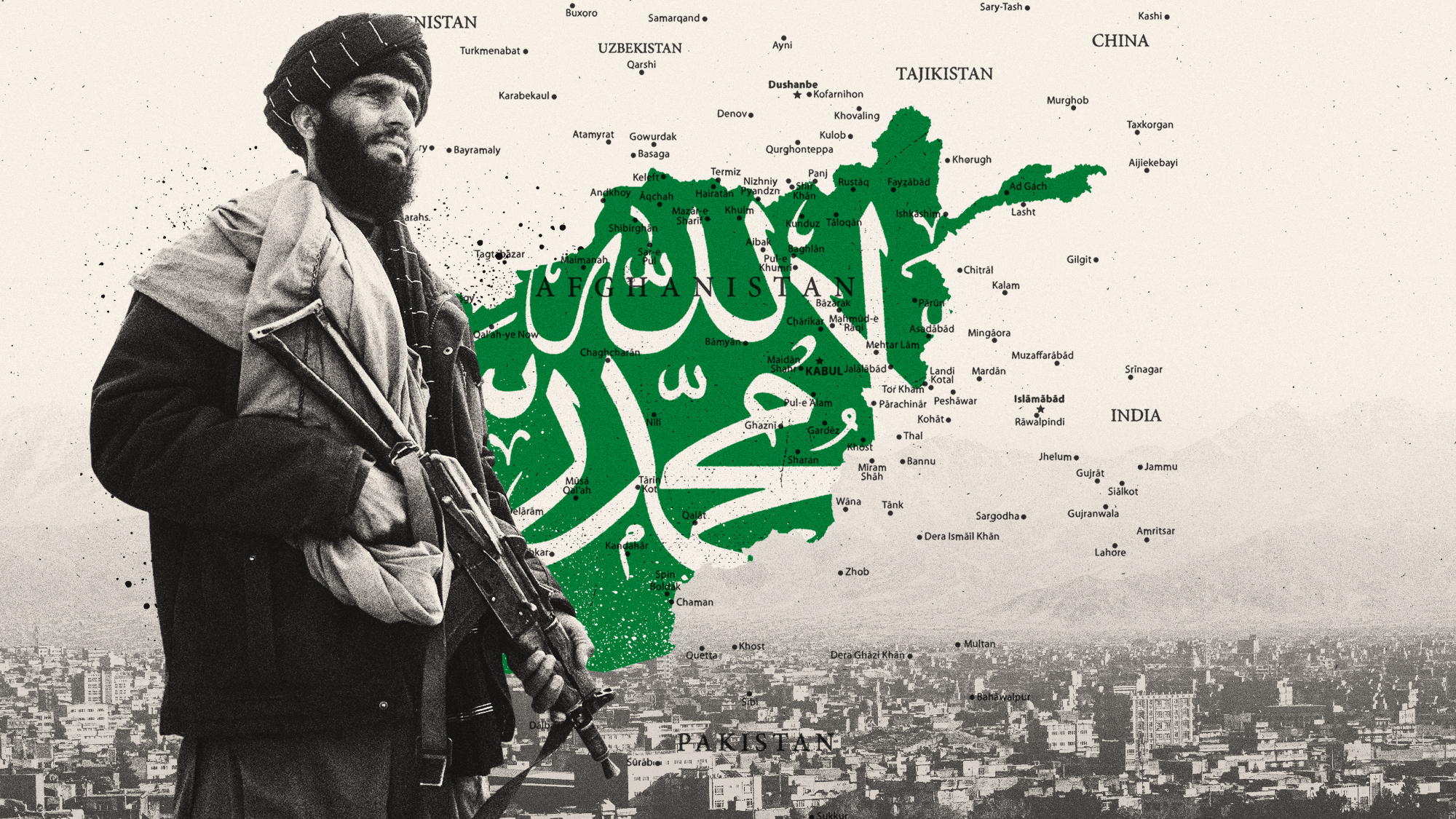What does the Taliban stand for?
Militants tell women to stay at home as radical overhaul gets underway

Working women must stay at home until the Taliban can implement a system that ensures their safety, the militant group has said.
While the order has been presented as practical rather than an ideological, it is another sign that life in Afghanistan will be different under the new regime.
“It’s a very temporary procedure,” Taliban spokesperson Zabihullah Mujahid told reporters. “Our security forces are not trained in how to deal with women, how to speak to women for some of them. Until we have full security in place... we ask women to stay home.”
The Week
Escape your echo chamber. Get the facts behind the news, plus analysis from multiple perspectives.

Sign up for The Week's Free Newsletters
From our morning news briefing to a weekly Good News Newsletter, get the best of The Week delivered directly to your inbox.
From our morning news briefing to a weekly Good News Newsletter, get the best of The Week delivered directly to your inbox.
The comment has drawn criticism from UN Human Rights High Commissioner Michelle Bachelet, who warned that the rights of women and girls represent a “fundamental red line” that must not be crossed by the Taliban.
Since sweeping into Kabul and taking back control of the country last week, the group has made few big changes. However, the Taliban “enforced a strict version of Islamic law when they ran Afghanistan before 2001”, the BBC said.
Who are the Taliban?
Meaning “two students” in Pashto (although often cited as simply meaning “students”), the group emerged in the early 1990s in northern Pakistan, following the withdrawal of Soviet troops from Afghanistan.
A free daily email with the biggest news stories of the day – and the best features from TheWeek.com
The group took its name “from its membership”, which was largely made up of students trained in Islamic religious schools, called madrasahs, which had been established for Afghan refugees in northern Pakistan throughout the 1980s, notes Britannica.
Thought to be funded by money from Saudi and Pakistani philanthropists “hoping to proselytize a particular interpretation of Islam” it was in these schools that “future Taliban members developed a belief in Shariah law”. They said this was “motivated by the suffering among the Afghan people”, according to Standford’s Centre for International Security and Cooperation (CISAC).
In 1994, Mullah Mohammed Omar, who had been studying in the Sang-i-Hisar Madrassa in Maiwand, Afghanistan, gathered a small group of students in Kandahar with a pledge to rid the country of warlords and criminals – ultimately forming the group that would become the Taliban.
Originally just 50 members, the Taliban grew to 15,000 people “within months” as students from madrasahs in Pakistan joined the movement, says CISAC. And “along with these new recruits came financial and military support from Pakistan”.
The Taliban controlled much of the country by 1996. It took Kabul and brought to an end the regime of President Burhanuddin Rabbani, one of the founders of the Islamic groups that became the Afghan mujahideen and resisted Soviet occupation throughout the late 70s and 80s.
Many in Afghanistan initially welcomed the Taliban, with Afghans “weary of the mujahideen’s excesses and infighting after the Soviets were driven out”, reports the BBC. The Taliban enjoyed early popularity “due to their success in stamping out corruption, curbing lawlessness and making the roads and the areas under their control safe for commerce to flourish”.
Yet they also introduced hardline punishments in line with a strict interpretation of Sharia law. There were “public executions of convicted murderers and adulterers, and amputations for those found guilty of theft”, explains the broadcaster.
And life for women would become increasingly difficult. Holding “virtually no rights” under the Taliban regime, “they were barred from education and forced to wear clothing that completely covered them”, says The Washington Post. Television, music, cinema and other forms of media were also banned.
Taliban rule collapsed in 2001 after a US-led coalition launched attacks in the country, following the 9/11 World Trade Centre attacks in New York.
The Taliban was accused of providing a safe haven for Islamic militants around the world. Among them was the al-Qaeda founder and prime architect of the terrorist attacks, Osama Bin Laden, who the Taliban refused to extradite to the US.
Who are its leaders?
The Taliban’s supreme leader is Haibatullah Akhundzada, an Islamic legal scholar who holds “final authority over the group’s political, religious, and military affairs”, says Reuters.
Known as Leader of the Faithful, he took over when his predecessor, Akhtar Mansour, was killed in a US drone strike in 2016.
Mullah Omar fled Afghanistan when the US toppled the regime in 2001. His whereabouts were “so secretive” that his death in 2013 was only confirmed two years after the fact, says the news agency.
Other key figures include Mullah Mohammad Yaqoob, the son of Mullah Omar, who is believed to be in his early 30s. Yaqoob oversees the group’s military operations and has been touted for overall leadership on several occasions. However, he stood aside for Akhundzada in 2016, telling commanders he “lacked battlefield experience and was too young”.
Mullah Abdul Ghani Baradar, a co-founder of the Taliban, heads the group’s political office in Doha and oversaw the signing of the withdrawal agreement with the Americans. It is rumoured he will become the next president of Afghanistan, reports CNBC.
Sirajuddin Haqqani leads the Haqqani network, a group designated by the US as a terror group that has “long been viewed as one of the most dangerous factions” fighting Afghan and US-led forces in Afghanistan, explains Euronews. It is “infamous for its use of suicide bombers” and orchestrated some of the most high-profile attacks in Kabul in recent years, says the news site.
What does the Taliban want for Afghanistan?
“The Taliban’s aim is simple,” Robert Crews, an Afghanistan expert from Stanford University, told The Washington Post. It is to “take back what the group lost in the early 2000s”.
“They want their Islamic emirate back in power,” Crews said. “They want their vision of Islamic law.”
He continued: “They don’t want a parliament. They don’t want electoral politics. They have an emir and they have a council of mullahs, and that’s the vision they see as best for Islam.”
Yet, it is “unclear” whether life under Taliban rule will be the same as it was during their earlier rule. A “civil society has burgeoned in the past two decades that didn’t exist before”, writes Derek Hawkins for the paper, and many experts have questioned “whether the Taliban would be able to govern a population that has changed”.
The Taliban leadership has indicated that it is open to women’s education in the context of a “genuine Islamic system” that was in line with cultural traditions and religious rules.
However, a report by the RHIPTO Norwegian Center for Global Analyses, which provides intelligence to the UN, has revealed that the militants have been going door to door to find targets and threaten their family members amid the ongoing evacuation of Afghans who worked alongside Nato troops.
Christian Nellemann, who leads the group, told the BBC that “there are a high number of individuals that are currently being targeted by the Taliban and the threat is crystal clear”.
Warning that anyone on the Taliban’s blacklist remains in severe danger, he added: “It is in writing that, unless they give themselves in, the Taliban will arrest and prosecute, interrogate and punish family members on behalf of those individuals.”
Julia O'Driscoll is the engagement editor. She covers UK and world news, as well as writing lifestyle and travel features. She regularly appears on “The Week Unwrapped” podcast, and hosted The Week's short-form documentary podcast, “The Overview”. Julia was previously the content and social media editor at sustainability consultancy Eco-Age, where she interviewed prominent voices in sustainable fashion and climate movements. She has a master's in liberal arts from Bristol University, and spent a year studying at Charles University in Prague.
-
 Political cartoons for January 4
Political cartoons for January 4Cartoons Sunday's political cartoons include a resolution to learn a new language, and new names in Hades and on battleships
-
 The ultimate films of 2025 by genre
The ultimate films of 2025 by genreThe Week Recommends From comedies to thrillers, documentaries to animations, 2025 featured some unforgettable film moments
-
 Political cartoons for January 3
Political cartoons for January 3Cartoons Saturday's political cartoons include citizen journalists, self-reflective AI, and Donald Trump's transparency
-
 How Bulgaria’s government fell amid mass protests
How Bulgaria’s government fell amid mass protestsThe Explainer The country’s prime minister resigned as part of the fallout
-
 Normalising relations with the Taliban in Afghanistan
Normalising relations with the Taliban in AfghanistanThe Explainer The regime is coming in from the diplomatic cold, as countries lose hope of armed opposition and seek cooperation on counterterrorism, counter-narcotics and deportation of immigrants
-
 Femicide: Italy’s newest crime
Femicide: Italy’s newest crimeThe Explainer Landmark law to criminalise murder of a woman as an ‘act of hatred’ or ‘subjugation’ but critics say Italy is still deeply patriarchal
-
 Brazil’s Bolsonaro behind bars after appeals run out
Brazil’s Bolsonaro behind bars after appeals run outSpeed Read He will serve 27 years in prison
-
 Americans traveling abroad face renewed criticism in the Trump era
Americans traveling abroad face renewed criticism in the Trump eraThe Explainer Some of Trump’s behavior has Americans being questioned
-
 Nigeria confused by Trump invasion threat
Nigeria confused by Trump invasion threatSpeed Read Trump has claimed the country is persecuting Christians
-
 Sanae Takaichi: Japan’s Iron Lady set to be the country’s first woman prime minister
Sanae Takaichi: Japan’s Iron Lady set to be the country’s first woman prime ministerIn the Spotlight Takaichi is a member of Japan’s conservative, nationalist Liberal Democratic Party
-
 Russia is ‘helping China’ prepare for an invasion of Taiwan
Russia is ‘helping China’ prepare for an invasion of TaiwanIn the Spotlight Russia is reportedly allowing China access to military training